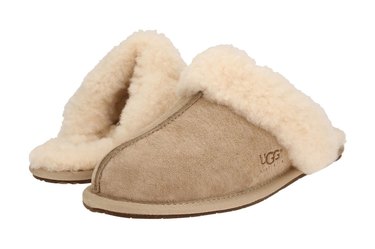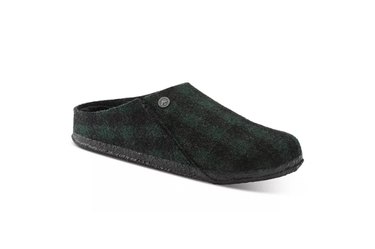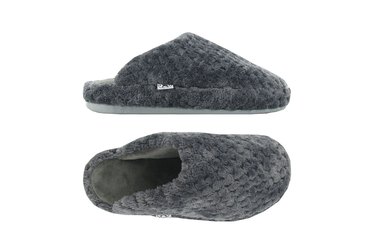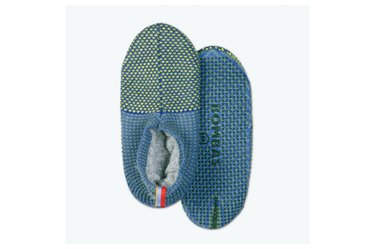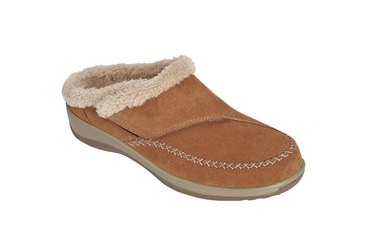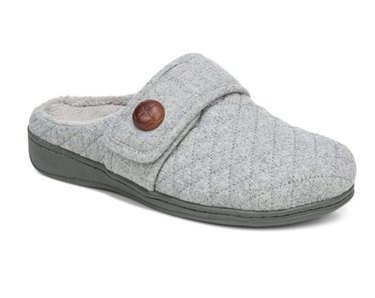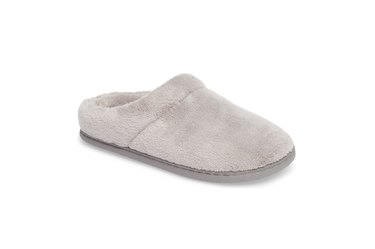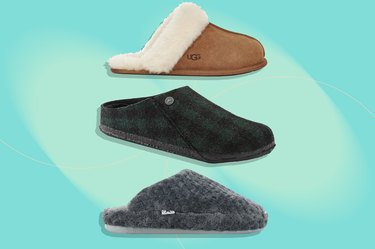
If you own a pair of slippers, you probably know they keep your feet nice and warm while you're indoors, especially during the cold winter months. But what you may not realize is that slippers do far more than keep your toes cozy. In fact, they add much-needed support to your bare feet.
Since the onset of the coronavirus pandemic, more and more people are working from home, which means far less time in shoes that give our feet the support we need to prevent aches and pains. This can quickly contribute to new-onset heel pain or ball-of-the-foot pain, Tim Oldani, DPM, podiatrist at Missouri Foot and Ankle in St. Louis, tells LIVESTRONG.com.
Video of the Day
Video of the Day
"Wearing slippers around the house is a simple way to minimize pressure on the feet and to add support," Dr. Oldani says. "Obviously, slippers cannot provide as much support and stability as a running shoe — however, if the right slipper is chosen, they can help minimize many common foot ailments."
Slippers also help decrease the formation of calluses on the bottom of the feet. "The more we are barefoot, the more callus we form on the bottom of the foot in weight-bearing areas to protect the skin overlying bone," says Nelya Lobkova, DPM, at Step Up Footcare in Manhattan. "Cornified skin, such as calluses, has a lower sensation as compared to non-callused skin, thus the more we are barefoot, the more we are at risk for stepping on foreign objects without knowing it." And that could spell trouble for your tootsies.
Here, podiatrists share some of their top recommendations for slippers that help keep your feet healthy.
The Best Slippers for Healthy Feet
- Best Overall: Ugg Scuffette Slippers (From $94.90, Zappos.com)
- Best With Arch Support: Birkenstock Zermatt Slipper (From $99.96, DSW)
- Best Supportive: NAOT Slippers (From $69.95, NAOT.com)
- Best for Sweaty Feet: Bombas Gripper Slippers ($45, Bombas.com)
- Best Orthopedic: Orthofeet Leather Slippers (From $94.95, Amazon.com)
- Best Indoor-Outdoor: Vionic Carlin Slippers ($79.95, VionicShoes.com)
- Best Cushion: Tempur-Pedic 'Windsock' Slipper ($44, Nordstrom)
How We Chose
We tapped three podiatrists, who shared their professional product recommendations and broke down what to look for in slippers that contribute to healthy feet.
We selected these products based on their criteria, including:
- Comfort
- Fit
- Durability
- Style
- Cost
For more information on how we choose and cover products, click here.
Why Are Certain Shoes Marketed to Men or Women?
Manufacturers often market shoes according to gender, so we have listed both women's and men's picks below. However, anatomically, there is little difference between most men's and women's shoes.
According to Dr. Lobkova, there is typically a slight inward curve in a woman's foot compared to men's feet. Additionally, she points out that a woman's foot is on average smaller for a given body weight. For this reason, men's slippers typically are slightly larger and wider compared to the same size in the women's slipper.
1. Best Overall: Ugg Scuffette Slippers (ON SALE)
Pros
- Durable
- Rubber outsole to prevent slips
Cons
- May not be enough support if you have a foot condition
This is one of Ugg's most popular pairs of shoes, let alone slippers — and for good reason.
They are well built and designed to keep feet warm in nearly any circumstance thanks to a sheepskin-warped lining, insole and collar. The rubber outsole helps ensure optimal stability and prevents slips. Plus, these slippers are durable enough to last years.
Buy it: Zappos.com (women's sizes 5-12, from $94.90); Amazon (men’s sizes 7-18, $89.95); Amazon (women’s sizes 5-13, $94.95); Ugg.com (women's sizes 5-12, $95)
2. Best With Arch Support: Birkenstock Zermatt Slipper
Pros
- Great arch support
- Comfortable
- Durable latex footbed
Cons
- Pricey
If you're looking for a slipper that gives you the right kind of arch support to wear all day long in the comfort of your home, Dr. Lobkova recommends checking out the Birkenstock Zermatt Slipper. This is especially important for people who have flat feet, as their condition can make them more prone to plantar fasciitis, she says.
True to the legendary design of all Birkenstocks, these slippers feature the original footbed construction that emphasizes comfort, along with a durable cork latex footbed and shearling-lined inside to keep your feet warm even in the colder seasons.
Buy it: DSW (women’s sizes 5-11.5, $99.96); Birkenstock (men's sizes 6-13.5, $99.95)
3. Best Supportive Slippers: NAOT Slippers
Pros
- Fleece-lined
- Protective outsole
- Shock absorption
Cons
- Can only be worn indoors
In order to be comfortable, slippers should provide added cushioning, especially under the heel and the ball of the foot, Dr. Oladni says. "These two areas need additional cushioning and shock absorption the most," he says. "This cushioning can help in people with certain ailments, such as metatarsalgia and plantar fasciitis."
He is a big fan of NAOT slippers because the firm and protective outsole is coupled with a soft, fleece-lining inside that provides both support and comfort.
4. Best for Sweaty Feet: Bombas Gripper Slippers
Pros
- Great for travel
- Lightweight
- Non-slip
Cons
- Less arch support
Feet prone to sweating? No need to slide around your home. Instead, slip on a pair of these non-slip slippers designed with silicone dots at the base to keep your feet firmly on the ground.
Their inside is lined with a fuzzy-but-breathable interior that makes you feel like you're wearing tiny blankets on your feet. They're also great for travel because they fold up just like socks.
Buy it: Bombas.com (men’s sizes M-XL); Bombas.com (women’s sizes S-L); Price: From $45
5. Best Orthopedic: Orthofeet Leather Slippers
Pros
- Great arch support
- Sweat-wicking
- Soft interior
Cons
- Pricey
This brand of shoes has an orthotic insole that has optimal anatomical arch support and heel cushioning, and it also wicks away sweat.
Orthofeet's slippers are no exception, but also feature some of the ideal attributes someone would want in a pair of slippers: a faux fur interior for warmth, a cushioned sole and a suede leather structure that provides durability.
6. Best Indoor-Outdoor: Vionic Carlin Slipper
Pros
- Can be worn indoors and outdoors
- Arch support
- Durable rubber sole
Cons
- May feel too structured to wear inside
Not only are these slippers biomechanically designed to fit snug to your entire foot, but the Vionic Technology helps foster your foot's natural alignment, providing arch support and structure to reduce foot ailments.
They have a durable rubber sole that's designed for both indoor and outdoor use, and that won't slide around easily, keeping your feet firmly attached to whatever ground you're walking on.
Buy it: VionicShoes.com (women's sizes 5-12, $74.95); VionicShoes.com (men's sizes 7-13, $109.95)
7. Best Cushion: Tempur-Pedic 'Windsock' Slipper
Pros
- Memory foam
- Super soft
- Indoor/outdoor rubber sole
Cons
- Less arch support
- Limited size options
Tempur-Pedic isn't just known for its cushiony mattresses. They also sell these luxurious-feeling 'windsock' slippers.
Apart from the brand's signature memory foam feel, these slippers also have a durable indoor/outdoor rubber sole and fuzzy, soft interior, making them great for walking indoors on hardwood or tile.
What to Look for in Slippers for Healthy Feet
1. Fit
Most brands of slippers will have a size chart to help you determine which size is most ideal for your feet. Unlike other types of shoes, slippers don't have to fit snug, Dr. Lobkova says. But there should be adequate room around the toes.
"If you feel like you are slipping out of them, choose a full-back slipper or slipper with an elevated heel," she says.
2. Style
Like other types of footwear, slippers come in all sorts of shapes, sizes and styles, such as moccasins, slides and thongs.
Jackie Sutera, DPM, podiatrist and Vionic Innovation Lab Member, recommends buying the style you prefer while making sure to choose a slipper that's supportive — not thin or flimsy. "Select foot-friendly styles that are cushioned and have arch support," she adds.
3. Durability
The durability of slippers depends on the amount of use and environment, Dr. Lobkova says. "If using outdoor and indoor, the durability diminishes compared to slippers only used indoors or only used outdoors," she says.
If you are looking for slippers for both indoor and outdoor wear, she recommends buying a separate pair for each to ensure they last longer. "It also prevents bringing dirt from the outside indoors and vice versa," she adds.
4. Comfort
For anyone dealing with foot pain or who stands on hard floors for long periods of time, Dr. Sutera recommends a cushioned, thicker sole with arch support and a "heel-to-toe drop" where the heel is thicker than the forefoot.
"A slipper with these features will cushion and absorb shock from body weight and gravity pushing down when standing," she says.
5. Care
Slippers, even if used indoors, should be washed frequently. If your slippers have a rubber base, Dr. Lobkova recommends cleaning them at least weekly using lysol wipes and letting them air dry.
6. Cost
Slippers shouldn't break the bank, but they also shouldn't be cheap either. Dr. Lobkova recommends making sure that the cost of the slipper is justified by the materials used in making the slipper. "Slippers made from leather or cork will be more expensive due to the expense of the materials," she says.
How Often Should You Replace Your Slippers?
Dr. Sutera recommends replacing slippers if there are any signs of wear or it looks like the soles are uneven.
Is this an emergency? If you are experiencing serious medical symptoms, please see the National Library of Medicine’s list of signs you need emergency medical attention or call 911.
